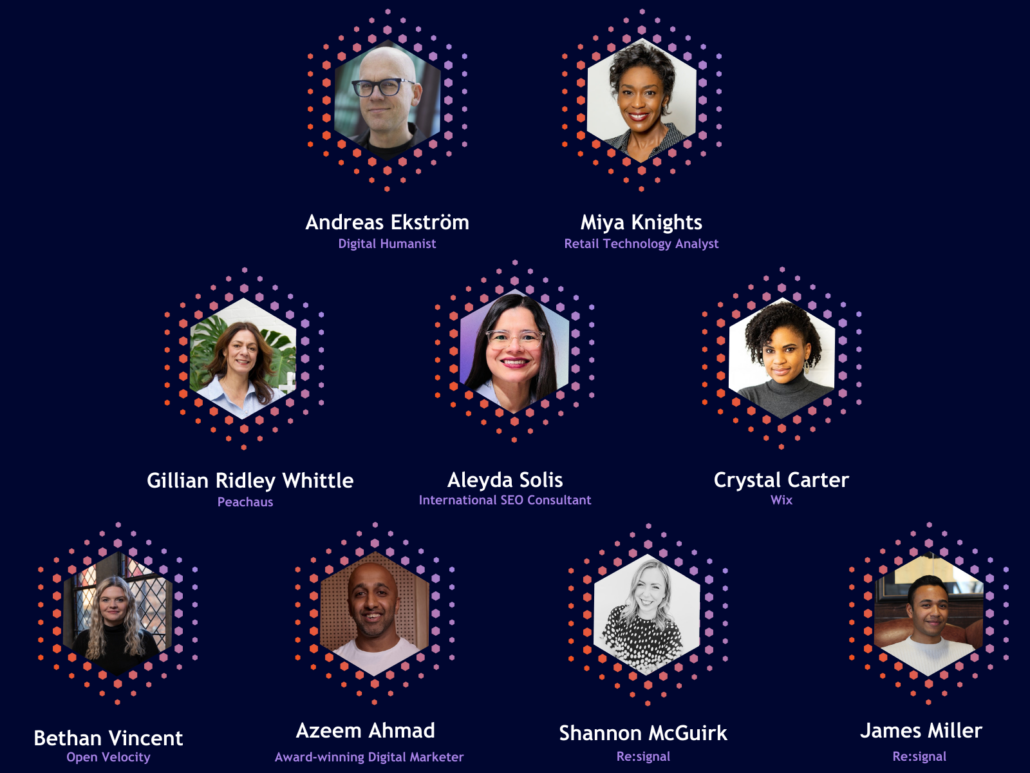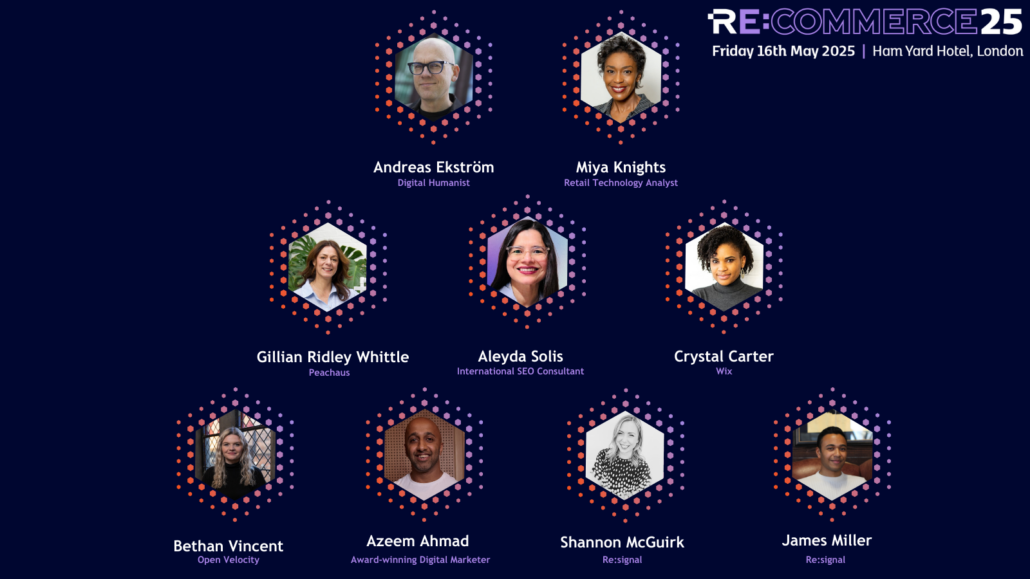How can ecommerce sites implement SEO-friendly faceted navigation without hurting crawl efficiency or creating index bloat?

Disclaimer: This is an extended, in-depth version of an article originally published on SEJ, expanding on the concepts in more detail to provide additional context, guidance, and best practices for SEO professionals.
Faceted navigation without the SEO fallout: a guide for ecommerce sites
Faceted navigation is a game-changer for user experience (UX) on large e-commerce sites. It helps users quickly narrow down what they’re looking for, whether it’s a size 8 pair of red road running trainers for women, or a blue, waterproof winter hiking jacket for men.
For your customers, faceted navigation makes huge inventories feel manageable and, when done right,
5 things we learned at Re:commerce 2025
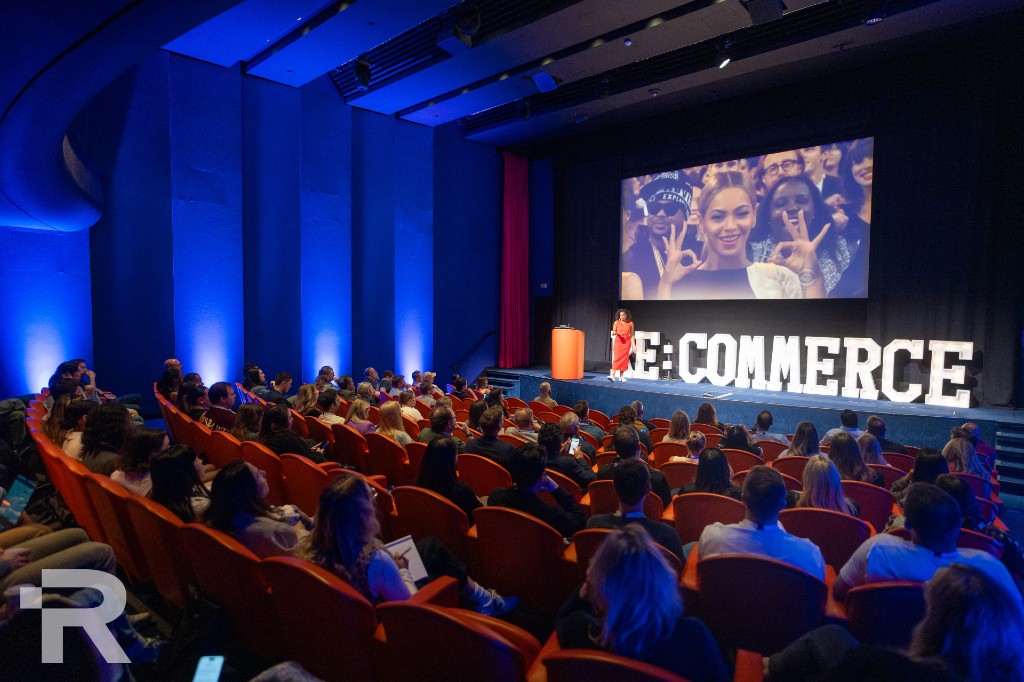
Almost two weeks on from Re:commerce 2025 and we’re still buzzing from the deep insights we gained from our expert speakers, as well as the engaging discussions we had with our wonderful attendees and sponsors.
We think 2025 was our best event yet and, judging from the feedback we’ve received so far from attendees, everyone who was at The Ham Yard Hotel agrees.
So, if you attended or even if you missed out, check out these five key takeaways from Re:commerce 2025.
AI is THE number one subject on people’s minds
It should’ve been no surprise, but the impact of artificial intelligence and large language models on ecommerce marketing dominated the conversation this year.
A lot of our speakers touched on AI and LLMs as part of their talks, but Crystal Carter, Head of SEO Communications at Wix, majored on this subject during her talk, specifically Generative Search visibility and how to optimise for this emerging channel.
For decades, SEOs have had to know which on-page and off-page factors will get their websites ranking in search results for the searches that matter most to them—now, they also need to know how to structure their content to give it the best chance of being referenced in LLM responses.
During her talk, Crystal pointed out that LLMs received a tiny fraction of global search traffic in Q1 2024, but that this increased by 1619% in just 12 months.
Of particular interest to ecommerce marketers was Crystal’s explanation of ChatGPT’s recently announced Shopping Results feature. When ChatGPT detects shopping intent in a query, it selects products to display based on a mix of factors:
- ‘Prompt intent analysis’ (user intent and context)
- What ChatGPT ‘remembers’ about the user
- Structured metadata including price, product description and reviews
These features are in the early stages, but it’s something you need to get on top of sooner rather than later, and you can now sign up to be notified when ChatGPT Product Feed submissions open.
Our first keynote speaker, journalist and author Andreas Ekström, also demonstrated some really interesting (and possibly a little scary, if you’re a musician) things AI can already do.
A big fan of Album-oriented Rock (think REO Speedwagon, Foreigner and Journey), Andreas treated us to a song he’d created in an app called Suno. It had all the trappings of a classic AOR track, including the vocal style and melodic guitar riffs.
Andreas then played our audience a video introducing himself in multiple languages, including Spanish, French and Japanese—except Andreas cannot speak fluently in any of them. They were AI-generated based on his likeness and a basic script, which could undoubtedly have numerous uses for multilingual teams.
» Read more about: 5 things we learned at Re:commerce 2025 »
5 Reasons you NEED to go to Re:commerce 2025
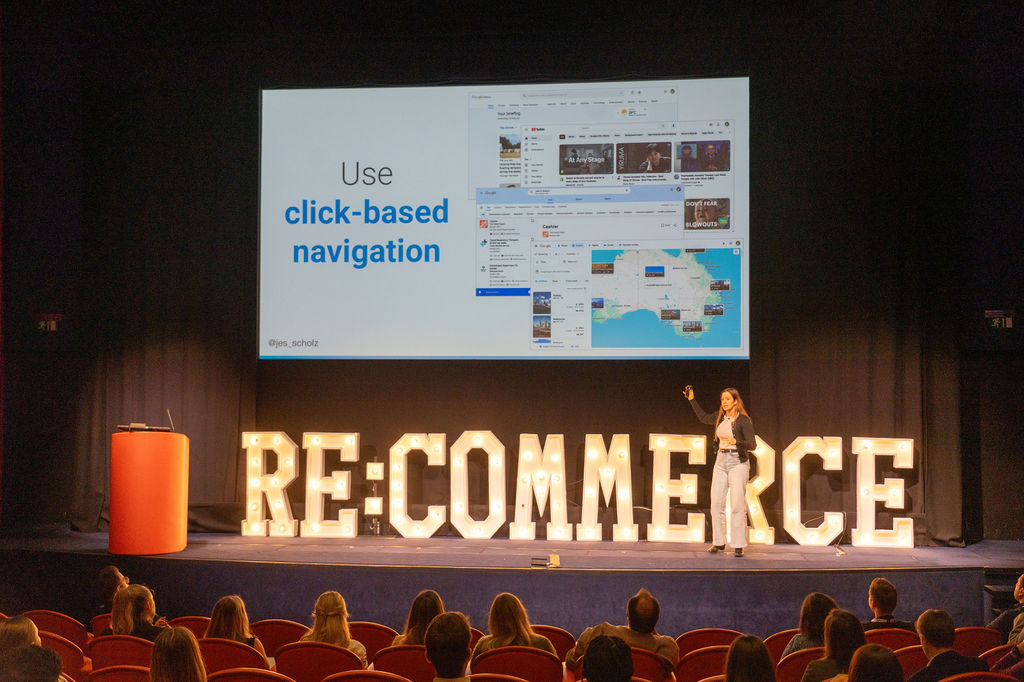
Re:commerce is back for 2025 and it’s set to be bigger and better than ever.
Search and digital marketing experts from some of the biggest ecommerce brands will be in attendance—including Disney, Waitrose, Under Armour, Marks & Spencer and Selfridges. Are you going to join them?
This year’s event will be hosted at The Ham Yard Hotel on Friday 16th May (8.30am – 5.30pm), and full day tickets are available for just £285.00 (ex. VAT). However, if you still need convincing, we’ve got five compelling reasons for you…
We’ve got an incredible line-up of expert speakers
Re:commerce has always boasted a fantastic speaker line-up, and 2025 is no different.
We’re delighted to be welcoming author and journalist Andreas Ekström, and Retail Technology Analyst Miya Knights, as our two keynote speakers. They’ll be giving us a broad perspective on how digital is shaping our relationships, culture and interactions, alongside the latest trends and strategies being adopted in eCommerce.
While we also have seven other experts that are highly regarded in the industry and the speaker circuit, including:
- Gillian Ridley Whittle, founder of Peachaus
- Aleyda Solis, international SEO consultant
- Crystal Carter, Head of SEO Communications at Wix
- Bethan Vincent, founder and Manager Partner at Open Velocity
- Azeem Ahmad, award-winning digital marketing expert
- Shannon McGuirk, Digital PR Director at Re:signal
- James Miller, Senior SEO Analyst at Re:signal
Our speakers will be discussing everything from high level retail marketing strategy through to in-depth advice on SEO, content and digital PR best practice.
“I had a great time speaking at Re:commerce. I was impressed with how polished the whole event was;
» Read more about: 5 Reasons you NEED to go to Re:commerce 2025 »
The Ultimate Guide to a Seamless CMS Migration

Building on our previous post, ‘The hidden costs of a botched site migration: Why ecommerce brands can’t afford to get it wrong’, we’re back with actionable steps to help you successfully migrate your CMS. If our last post made one thing clear, it’s that getting it right is absolutely critical!
What is a CMS?
If you have a website, chances are you’re using a CMS (Content Management System). It’s the software that powers your site, enabling you to easily create, manage, edit and publish your website content.
You might feel like your current CMS just isn’t cutting it. Maybe it’s missing key features you need, or it can’t keep up as your website grows with more content and traffic. Whatever the reason, you’ve realised it’s time for a change—and a new CMS might be the solution.
The next step is migrating to your new CMS, and it needs to be done right. A poorly executed migration can lead to broken links, duplicate content, or missing pages, causing your SEO efforts to unravel. Proper planning ensures redirects are set up correctly, preserving your site’s authority and organic performance.
Therefore what we’ve done here at Re:signal, is
» Read more about: The Ultimate Guide to a Seamless CMS Migration »
The full agenda for Re:commerce 2025 has been announced

There are now less than 10 weeks to go until Re:commerce 2025, and the full agenda has now been announced.
We’ve got an incredible line-up of speakers, boasting some of the brightest minds working in digital marketing, SEO and ecommerce right now. This is a must-attend event for ecommerce brands and marketers that want to keep their finger on the pulse of the rapidly changing digital landscape. To ensure continued growth in 2025 and beyond we need to be able to think differently and challenge how we do things, rather than expecting the same old tactics to continue driving revenue as customer behaviour changes.
Let’s take a closer look at our speakers and what they’ll be sharing with our attendees.
Our opening keynote — Andreas Ekström
Digital Humanist | Author | Journalist
Organic Intelligence is the New Superpower
Andreas Ekström has spent many years reporting on how media, business and politics is impacted by the major digital power players in the world, working as a culture reporter and columnist for Sydsvenskan, a national Swedish newspaper.
Andreas has also been an educator since 2010 and a regular on the international conference circuit, and is a highly sought after speaker that has been very well received across Europe thanks to the deep insight provided by his lectures.
At Re:commerce 2025, Andreas will kickstart the day with his thought-provoking ideas, questions and hands-on tools that help us to understand the impact the digital world has on relationships, culture and human interactions, stressing the importance of ‘organic’ intelligence as we enter the artificial intelligence revolution.
Gillian Ridley Whittle
Founder | Peachaus
Breaking the Mould in Retail Strategy
Pulling on her experience of over 30 years in commercial retail, Gillian Ridley Whittle will take Re:commerce attendees on her journey from big brand fashion director (M&S, Target, Topshop) to founder of Peachaus, a lifestyle brand with an ethical stance focused on changing customer mindsets and building a sustainable brand.
Gillian will share her experience of applying offline learning to building a digital presence, helping us to understand how experience-based retail is taking shape online and providing inspiration of how to think differently in the world of ecommerce.
Crystal Carter
Head of SEO Comms | Wix
Building Brand Visibility in an Evolving ecommerce Landscape
Large language models (LLMs) are causing a lot of disruption to the search landscape right now, and brands need to adapt if they want to remain visible to their target market.
Backed by over 15 years of SEO and digital marketing experience, Crystal Carter will provide Re:commerce attendees with her take on the challenges ecommerce brands have to tackle—but also the opportunities that AI can offer.
Crystal will also discuss the broader implications on marketing in an AI-enabled world, ahead of a quickfire Q&A session with fellow Re:commerce speaker Shannon McGuirk and Re:signal’s founder Kevin Gibbons.
Shannon McGuirk
Digital PR Director | Re:signal
How to Win in Digital PR Through Audience Understanding
Shannon McGuirk joined Re:signal as Digital PR Director in October, bringing with her a wealth of experience of driving organic growth for leading ecommerce brands like ASICS, FatFace and Under Armour.
Shannon is also a veteran of the industry speaker circuit, having given talks at MozCon, BrightonSEO and Outreach, and we’re delighted to have her as part of the Re:commerce 2025 line-up.
» Read more about: The full agenda for Re:commerce 2025 has been announced »
Revisiting 3 big themes from Re:commerce 2024

It’s almost 12 months since Re:commerce 2024, which proved to be a fascinating event filled with expert insights from some of the brightest minds working in e-commerce, digital marketing and SEO.
We summarised the event’s key takeaways here, but ahead of Re:commerce 2025 on Friday 16th May we wanted to revisit those themes and give our updated take, and a hint of some of the hot topics and insights we’ll be sharing at this year’s event.
AI continues to reshape search
Unsurprisingly, artificial intelligence was a key topic of discussion for multiple speakers at Re:commerce 2024, including how it’s reshaping search.
While our job used to be to create content that resonated with users and was optimised for search algorithms, we’re now also needing to think about how to get visibility with AI in the mix. Focus is needed on brand connection and bringing our A-game when creating content. AI won’t surface our content unless it adds value to the end user.
Jono Alderson, an award-winning technical SEO consultant with almost 20 years experience in the industry, discussed how we all need to take more responsibility for the low value pages being created by AI.
As Jono points out, what we fail to consider is that there are lots of people just like you following the exact same process for content production.
Figuring how to create unique, high value content isn’t necessarily a new issue for marketers, but AI is reshaping the search landscape. As Jono highlighted in his talk, Google (and other search engines) can increasingly synthesise results without having to send visitors to your website.
Dawn Anderson, international SEO consultant and MD at Bertey, discussed similar points in her talk. Dawn explained how AI is now more accurately predicting search preferences and outperforms human evaluation for ranking—all at a fraction of the cost.
Our take
In 2025, successful SEO strategies are starting to prioritise a strong focus on positive brand building, as well as an increased focus on efficient crawling and discovery of content. This isn’t just about surfacing content in Google Search, but across all touchpoints in the customer journey. Google has been crawling websites for decades now, but Answer Engine crawlers need a helping hand to see the ‘right’ content and serve it up to the user. Brand trust and deep subject matter expertise are now essential to achieving visibility.
Mediocrity is not a means of survival
» Read more about: Revisiting 3 big themes from Re:commerce 2024 »
The EU Accessibility Act: What eCommerce Websites Need to Know and Do
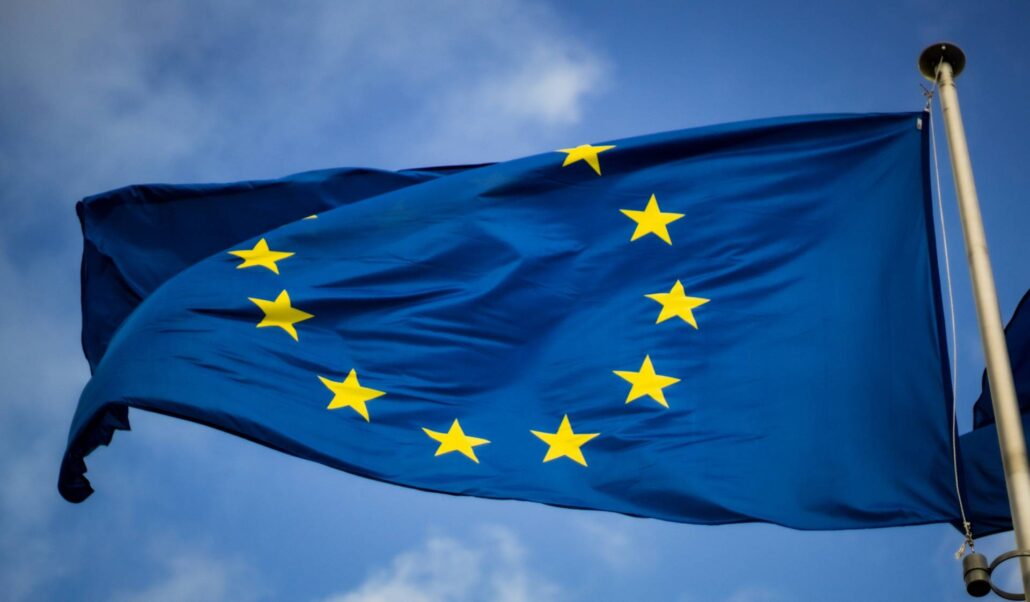
Does your company have a plan for complying with the EU’s upcoming Accessibility Act? Coming into effect on 28th June 2025, it requires any business that wishes to trade in the EU to provide accessible digital services. For eCommerce websites, complying with the EU Accessibility Act is going to be essential – and it could mean big changes to how your website operates.
In this blog, you’ll get up to speed on what the Act is, why it’s being introduced, and how you can start preparing.
What is online ‘accessibility’?
Accessibility is not a new thing. The World Health Organisation reports that 16% of the world population (1.3 billion people give or take), live with a disability. However, there has been a noticeable uptick of interest in the topic among companies recently (that interest should have always been there really) –
» Read more about: The EU Accessibility Act: What eCommerce Websites Need to Know and Do »
5 ecommerce tips from our SEO experts
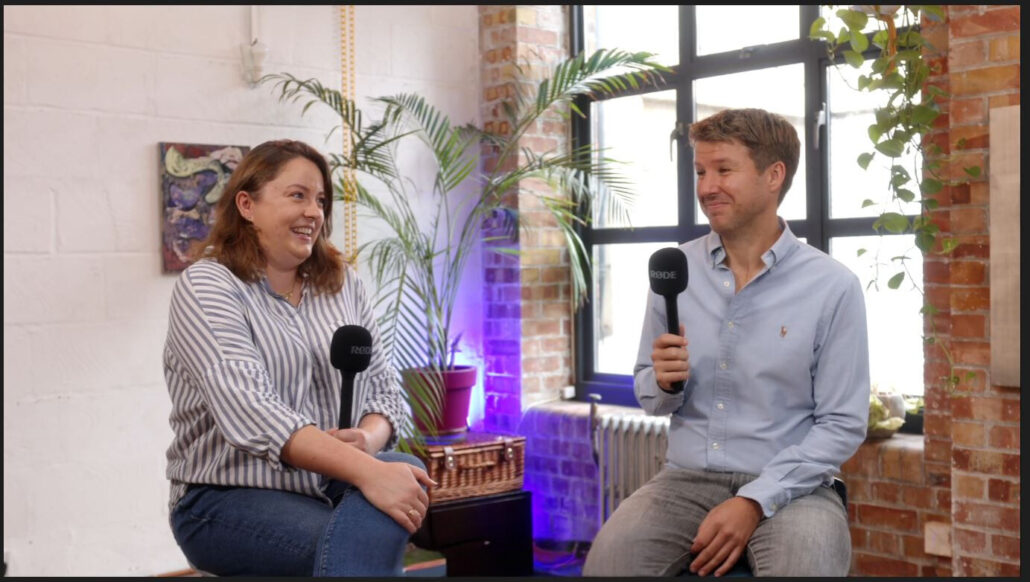
It’s been a tough time for ecommerce brands, with the combined economic shocks of high inflation and the cost of living crisis impacting both overheads and consumer buying power.
It’s also been a year of change in the organic SEO landscape, all of which translates to tricky terrain for brands to navigate.
With this in mind, we thought we’d ask our expert SEO team what they thought about the last 12 months, and what to have on your radar. Check out the advice Marie Turner, Amanda Beales and Kevin Gibbons have for ecommerce brands heading into 2025.
1. Focus on high conversion rate keywords
We’ve seen massive changes to ecommerce SEO in the last 12 months, and that’s on top of it having been a tough year for the sector as a result of continuing cost of living pressures.
The biggest change in 2024 has been the insertion of AI results into the search results pages (SERPs) for a lot of informational keywords—but we expect AI results to be introduced to Google Shopping at some point in 2025. This might offer some benefits for the consumer, but as brands we’re going to lose some traffic to these AI answers.
To counteract this shift we need to remember traditional marketing principles—and it’s an approach we’re taking with all of our clients.
You need to understand your niche, get to know your customers really well, and make sure you answer their questions and expectations when they search.
We’ve also seen that product pages are becoming more important, so we’re looking at very niche categories with keywords that have lower search volumes, but that convert at a much higher rate.
2. Product page optimisation has never been more important
The ability to shop directly in the SERPs isn’t necessarily new, but as the user experience has improved we’ve seen that more and more consumers are taking this route. The top ten results for 85% of apparel-related searches have organic product tiles in them now, and retailers are taking the bulk of this traffic.
This means your product listings need to be ready to be served up in the SERPs.
To capture this traffic, marking up structured data within the different elements of your product pages is essential, for example optimising product titles and product images, and emphasising any unique features of your products or service
3. You need a faceted navigation strategy
Faceted navigation has been really important to ecommerce websites for a long time, that is, being able to index specific filters and answer niche queries.
Google has recently been doing a lot of work to surface product pages in the SERPs more frequently and if, as we expect, they introduce AI results to Shopping soon, an optimised faceted navigation strategy will be even more important. Getting this in place now will allow you to steal a march on the competition in terms of being indexed for niche keywords.
4. Solve for consumers at every stage of the customer journey
Don’t just optimise your bottom of funnel touchpoints, but instead get to know your customer and what they expect and search for at each stage of the customer journey.
Think about their specific interests and what content you can create that engages them, answers their questions or educates them on something new. Taking this full funnel approach, from awareness to consideration to conversion, will allow you to maximise revenue.
5. Download the Sportswear and Athleisure Ecommerce SEO report
Finally, if you’re a sportswear and athleisure retailer, make sure you check out our free industry report. We explored this growing sector and analysed the top performers in organic search, as well as the strategies they’re adopting.
It had been our expectation that more niche branded sites would perform better, because that’s what Google had rewarded historically. However, we found that the more generalist sites had the biggest share of voice over the last 12 months.
We also found out that user satisfaction was higher online than shopping in store (56% versus 44%), demonstrating the value of investing in improving and streamlining the online shopping journey.
Complete list of SEO conferences in 2025

We have just updated our list of ecommerce + SEO conferences and events to attend in 2025.
If you’d like to suggest any we may have missed, please do so here.
P.S. We have a lot planned for 2025, with networking events coming up in London, Manchester, Amsterdam and more. Plus our very own 1-day Ecommerce SEO conference in London on 16th May 2025. Stay up to date with all our Re:signal events by following us on 𝕏.
» Read more about: Complete list of SEO conferences in 2025 »
Masterclass: Optimising Salesforce Commerce Cloud (SFCC) Sites for SEO: Part 3 – Manual and Rule-Based On-Page SEO Implementation

In Part 1 of our guide on optimising Salesforce Commerce Cloud (SFCC) sites for SEO, we explored the essential aspects of hostname configuration, location mapping, and URL structure.
Part 2 covered another crucial element of SEO: website crawling and redirect tools to enhance indexing and crawling strategies for URL prioritisation.
Now, in Part 3 of the series, we turn our attention to the crucial elements of on-page SEO. While technical SEO sets the stage for search engines to effectively crawl and index your site, on-page SEO ensures that each individual page is primed for ranking well in search engine results.

